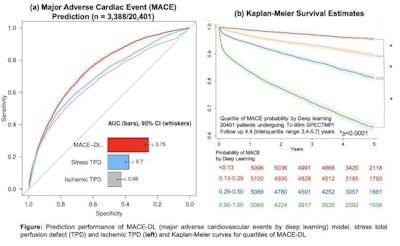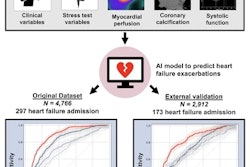
The combination of artificial intelligence (AI) and SPECT myocardial perfusion imaging (MPI) can accurately predict future major adverse cardiac events, according to research being presented on June 13 at the annual meeting of the Society of Nuclear Medicine and Molecular Imaging (SNMMI).
A multi-institutional research team led by Piotr Slomka, PhD, of Cedars-Sinai Medical Center in Los Angeles trained and tested a deep-learning algorithm using over 20,401 patients who had received SPECT MPI. They found that patients with the highest deep-learning risk score were more than 10 times likely to have a major adverse cardiac event (MACE) over about five years of follow-up.
The algorithm, called MACE-DL, also outperformed predictions based on automatic quantitation of perfusion.
"These findings show that artificial intelligence could be incorporated in standard clinical workstations to assist physicians in accurate and fast risk assessment of patients undergoing SPECT MPI scans," said first author Ananya Singh of Cedars-Sinai Medical Center in a statement from SNMMI. "This work signifies the potential advantage of incorporating artificial intelligence techniques in standard imaging protocols to assist readers with risk stratification."
 Prediction performance of deep learning compared to quantitative measures and Kaplan-Meier curves for quartiles of deep learning. Image courtesy of the SNMMI.
Prediction performance of deep learning compared to quantitative measures and Kaplan-Meier curves for quartiles of deep learning. Image courtesy of the SNMMI.In addition to providing a risk score in less than one second, the MACE-DL algorithm highlights the polar map regions of the heart that are associated with risk of major adverse cardiac events. The algorithm was developed using data from 20,401 patients from the Registry of Fast Myocardial Perfusion Imaging with Next-Generation SPECT (REFINE SPECT) who were followed for an average of 4.7 years.
In testing, patients with the highest deep-learning scores had an annual major adverse cardiac event rate of 9.7%, a 10.2-fold higher risk than patients with the lowest scores.





















